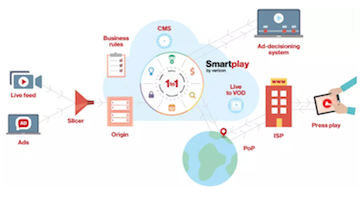Phone and Cable ISPs Assemble a Big Data Commercial Surveillance Apparatus Aimed at Californians: Use of “hyperlocal” data targeting practices bring greater privacy threats to neighborhoods and communities.
-
Key control of multiple devices, including TV. ISPs have positioned themselves to expand their consumer data collection across all the devices/platforms they operate. This includes broadband connections (including streaming media), mobile devices, PCs, and also TV. Unlike Google and Facebook, the cable and telephone ISPs largely control the TV set. Comcast has enabled its NBC division to use its set-top (link is external) box data for targeting, for example.
-
Phone and cable companies work with leading data brokers and data marketing “clouds” in order to develop granular and actionable profiles of individuals. This gives ISPs robust understanding of the actions and behaviors of consumers, including financial, health, ethnic, racial, shopping, and even politically related data—all of which is used for personalized targeted marketing. Examples include Comcast (link is external) and Verizon working with Acxiom, among others; Comcast (link is external) and Verizon working with real-time data targeting company MediaMath; Verizon and Comcast (link is external) working with Oracle’s (link is external) marketing cloud division; and Experian (link is external) providing data to Verizon/AOL and AT&T (link is external).
-
ISPs are Identifying and targeting a single consumer across all the devices that person uses—through “cross device identification.” Verizon (which operates both AOL and Yahoo) works with Acxiom’s LiveRamp division. LiveRamp specializes in helping clients fuse together data that allows specific individuals to be identified (link is external) on all their devices, through LiveRamp’s “IdentityLink” LiveRamp matches “PII-based data—like emails, postal addresses, and phone numbers—with…cookies and device IDs….” The company maintains “consistent recognition on 98% of U.S. adults and nearly 100% of U.S. households.” Verizon’s Precision Insights Program is listed as a LiveRamp partner (“the two companies are leveraging the PrecisionID” to give advertisers the ability to run “list-matching” campaigns in mobile, and serve mobile ads to an already built CRM list). AT&T also has a connection with LiveRamp, via its alliance (link is external) for app-based data targeting with Opera Mediaworks. The list of LiveRamp’s data partners is far-reaching, suggesting that Verizon, for example, can acquire extensive data elements on individuals. AT&T has also worked with cross-device targeting specialist Tapad. (link is external) Verizon works with another cross-device company—Drawbridge (link is external)—which also has multiple data-broker partnerships.
-
Phone and cable companies are using set-top box data to also target consumers on their other devices. For example, AT&T recently boasted, “we are now targeting that same consumer across TV and mobile.”
-
ISPs are expanding their use of consumer geolocation data for commercial tracking and ad targeting, creating new privacy threats to neighborhoods and communities. For example, leading geo-tracking company Factual (link is external) is a partner (link is external) with Verizon’s AOL. AT&T (link is external) and Verizon (link is external) also work with geotargeter PlaceIQ.
-
ISPs have been on a data-targeting spending spree to acquire companies that help them target across devices and applications. AT&T has partnered with ad- (and now also data-) giant WPP to own (link is external) a company that helps deliver digital TV and other interactive ads across devices. They are using “verified subscriber identities” to deliver addressable TV and mobile ads, including through apps. Verizon’s acquisition of Yahoo (including Yahoo Finance and Yahoo Mail) gave it control of over 600 million mobile monthly users. Yahoo mail has “225 million logged-in users,” for example, lending valuable scale to AOL’s (link is external) ad-platform business. “Verizon’s subscriber data coupled with Yahoo content and email addresses enables more precise ad targeting,” explained (link is external) one leading publication.
-
ISPs are using their data clout to deliver insight-based targeting. Verizon, for example, promises that it “allows advertisers to pinpoint very specific targets by households.”
—-
